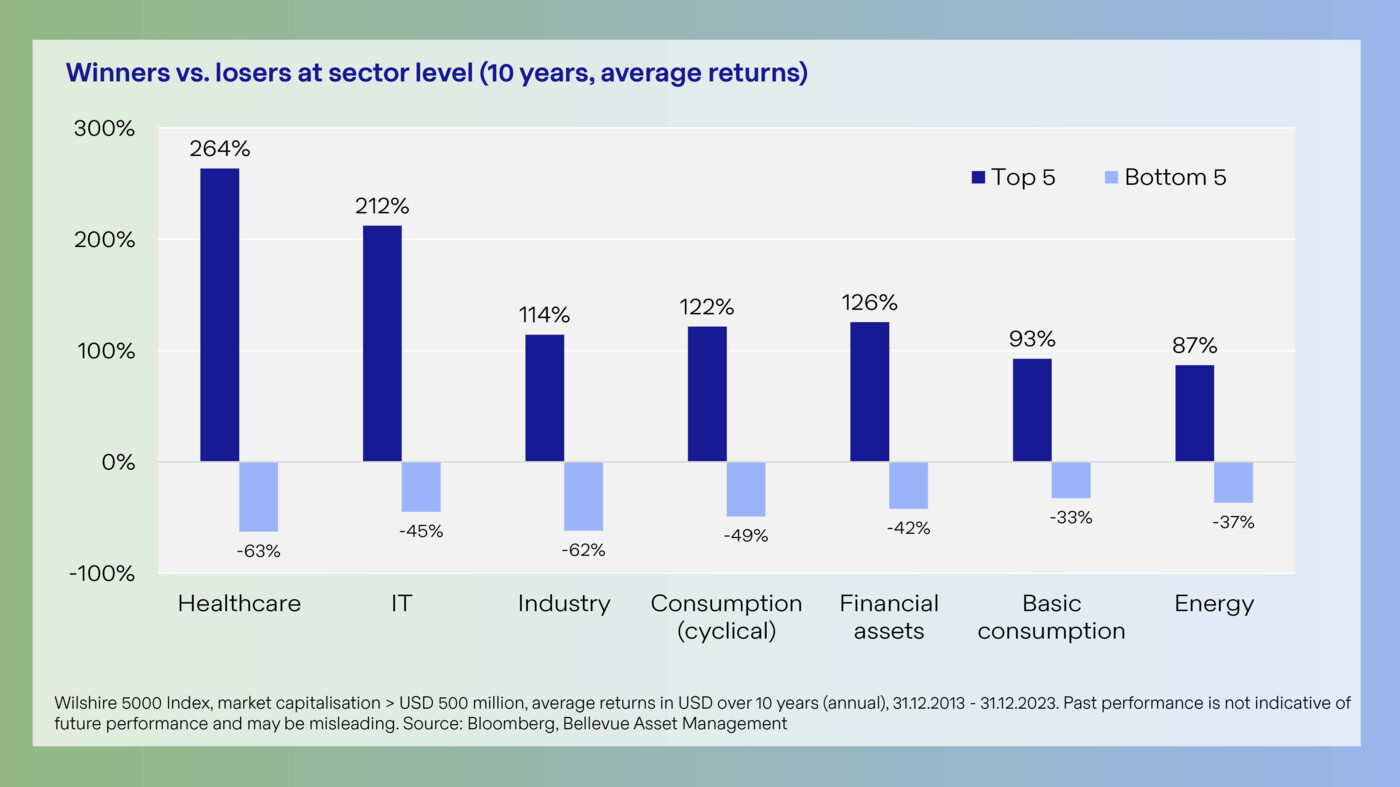Explained in 90 seconds
Healthcare systems will benefit from the huge pools of data that have been built up over decades
GenAI will be a relevant driver of shareholder value
Sweet spot: Well-capitalized companies with strong AI capabilities
Indexed performance (as at: 15.12.2025)
NAV: USD 147.57 (11.12.2025)
Rolling performance (15.12.2025)
| B-USD | Benchmark | |
| 11.12.2024 - 11.12.2025 | 7.38% | 9.65% |
| 11.12.2023 - 11.12.2024 | 9.81% | 8.62% |
Annualized performance (15.12.2025)
| B-USD | Benchmark | |
| 1 year | 7.38% | 9.65% |
| Since Inception p.a. | 8.51% | 9.40% |
Cumulative performance (15.12.2025)
| B-USD | Benchmark | |
| 1M | 0.99% | 1.91% |
| YTD | 11.84% | 13.70% |
| 1 year | 7.38% | 9.65% |
| Since Inception | 18.06% | 20.07% |
Annual performance
| B-USD | Benchmark | |
| 2024 | 1.96% | 1.13% |
Facts & Key figures
Investment Focus
The fund’s aim is to achieve capital growth in the long term. The Bellevue AI Health Fund is a global equity fund with an actively managed portfolio of 50 to 70 stocks, mostly from the healthcare sector, rounded out with a small number of tech companies that have considerable exposure to the healthcare industry. Show moreShow less
Investment suitability & Risk
Low risk
High risk
General Information
| Investment Manager | Bellevue Asset Management AG |
| Custodian | CACEIS BANK, LUXEMBOURG BRANCH |
| Fund Administrator | CACEIS BANK, LUXEMBOURG BRANCH |
| Auditor | PriceWaterhouseCoopers |
| Launch date | 30.11.2023 |
| Year end closing | 30. Jun |
| NAV Calculation | Daily "Forward Pricing" |
| Cut of time | 15:00 CET |
| Management Fee | 1.60% |
| Subscription Fee (max.) | 5.00% |
| ISIN number | LU2721086093 |
| Valor number | 130854650 |
| Bloomberg | BAIHXBU LX |
| WKN | A3E1ZR |
Legal Information
| Legal form | Luxembourg UCITS V SICAV |
| SFDR category | Article 8 |
Key data (30.11.2025, base currency USD)
| Beta | 0.93 |
| Volatility | 14.65 |
| Tracking error | 5.19 |
| Active share | 21.39 |
| Correlation | 0.94 |
| Sharpe ratio | 0.33 |
| Information ratio | -0.29 |
| Jensen's alpha | -1.21 |
| No. of positions | 70 |
Portfolio
Top 10 positions
Geographic breakdown
Benefits & Risks
Benefits
- GenAI is speeding up the process of digitization and automation across the healthcare system.
- GenAI can enhance patient care, simplify processes and procedures, and lead to better decisions.
- Companies that use or provide GenAI tools for healthcare-relevant purposes will gain a sustainable competitive advantage.
- Shareholder value creation will largely be determined by a company’s AI strategy and its execution.
- Bellevue – a pioneer in healthcare investing since 1993 and now one of the largest independent investors in the healthcare space in Europe.
Risks
- The fund actively invests in equities. Stocks are subject to price fluctuations, so there is a risk of falling prices.
- The investments the fund makes may be denominated in foreign currency, which can entail a foreign-exchange risk relative to the fund's base currency.
- The fund may invest some of its assets in financial instruments that may have relatively low levels of liquidity under certain circumstances, which may then affect the liquidity of the fund’s own shares.
- There are additional risks in the form of political and social unrest when investing in emerging markets.
- The fund may use derivatives. Derivatives offer greater upside potential yet also carry greater downside risk.
Review / Outlook
The US labor market data for September, published in November, showed a mixed picture. Although more jobs were created than expected, the unemployment rate came in above expectations while wage growth fell short. Consumer sentiment also weakened significantly. As a result, the likelihood of another interest rate cut by the US Federal Reserve in December increased.
The MSCI World and the S&P 500 each gained 0.3% in November, while the Nasdaq 100 declined by 1.6%. The healthcare sector once again delivered a strong performance, rising by a substantial 8.1%. Pharma, biotech and medtech stocks were the main drivers. Additional momentum came from an agreement between Eli Lilly and Novo Nordisk and the US government, which expands access to obesity medications through a targeted pricing strategy. The Bellevue AI Health Fund advanced 7.7% but did not outperform its benchmark.
Biopharma (end weight 55.3%) contributed 6.4% to absolute performance but detracted slightly from relative performance (-0.2%). The strongest contributors were Eli Lilly (+24.8%), Merck & Co (+21.9%) and Johnson & Johnson (+10.2%), while Recursion Pharmaceuticals (-16.1%), Zoetis (-11.0%) and Sanofi (-1.4%) weighed on performance. Eli Lilly reached an agreement with the US government that will expand access to obesity drugs for Medicare and Medicaid beneficiaries through a targeted pricing strategy. Merck strengthened its pipeline with the USD 9.2 bn acquisition of Cidara Therapeutics, adding CD388, whose Phase III results are expected from June 2026, and presented data on its oral PCSK9 inhibitor enlicitide, which could become a multibillion-dollar opportunity in cholesterol lowering starting in 2026.
The medtech segment (28.0%) contributed 1.1% to absolute performance but detracted -0.2% in relative terms. Medtronic (+16.1%), Intuitive Surgical (+7.3%) and Thermo Fisher (+4.1%) made the strongest positive contributions, while Siemens Healthineers (-10.9%), Hoya (-7.8%) and EssilorLuxottica (-2.0%) detracted. Medtronic reported stronger-than-expected revenue growth, supported by robust demand for its latest-generation pulsed-field ablation catheters. Siemens Healthineers, however, disappointed investors with its third-quarter report and its nvestor day, falling short of high expectations.
Healthcare services companies (11.0%) contributed 1.0% to absolute performance and 0.6% to relative performance. BillionToOne (+117.0%), HCA Healthcare (+10.6%) and McKesson (+8.6%) made positive contributions, while Omada Health (-23.8%) and UnitedHealth (-3.5%) had a slightly negative impact. BillionToOne, whose IPO we participated in during November, uses its AI-based Quantitative Counting Template (QCT) core technology in prenatal diagnostics and liquid biopsy for cancer detection and monitoring. Omada Health exceeded high expectations but referred to 2026 as an investment year, which raised concerns among investors regarding profitability.
The technology segment (4.0%), which comprises companies from the healthcare and information technology industries, detracted -0.5% from both absolute and relative performance. Waystar (+3.0%) contributed slightly positively, while Oracle (-23.1%), Veeva Systems (-17.5%) and Nvidia (-12.6%) declined meaningfully. Veeva exceeded quarterly expectations and raised its full-year guidance but closed fewer CRM contracts to large pharmaceutical companies than anticipated. Oracle and Nvidia corrected as investors grew increasingly skeptical about the sustainability of investments in AI infrastructure.
All performance data in USD / B shares.
The rapid development of generative artificial intelligence (GenAI) is ushering in an unprecedented technology-driven transformation that ranks right next to other key milestones such as the Internet, cloud computing, and smartphones. GenAI is creating tremendous opportunities for businesses and investors, especially in the healthcare sector. According to a number of studies, the healthcare sector will be one of the industries that will benefit the most from the deployment of GenAI. This forecast is mainly based on the vast potential for efficiency gains in healthcare systems, on the large, readily available amounts of data in healthcare systems, and on the considerable financial resources available for healthcare needs.
Medications are already being developed more quickly and with better rates of success, new diagnostic and treatment methods are producing better clinical outcomes, and GenAI is helping medical professionals make better and more informed decisions. We focus on healthcare companies that have made GenAI a core element of their business strategy and that are investing substantial resources in this technology to gain a lasting competitive advantage and deliver superior growth. The technology risk here is more calculable than in other industries because healthcare is such a heavily regulated industry.
Documents
Show moreShow less







